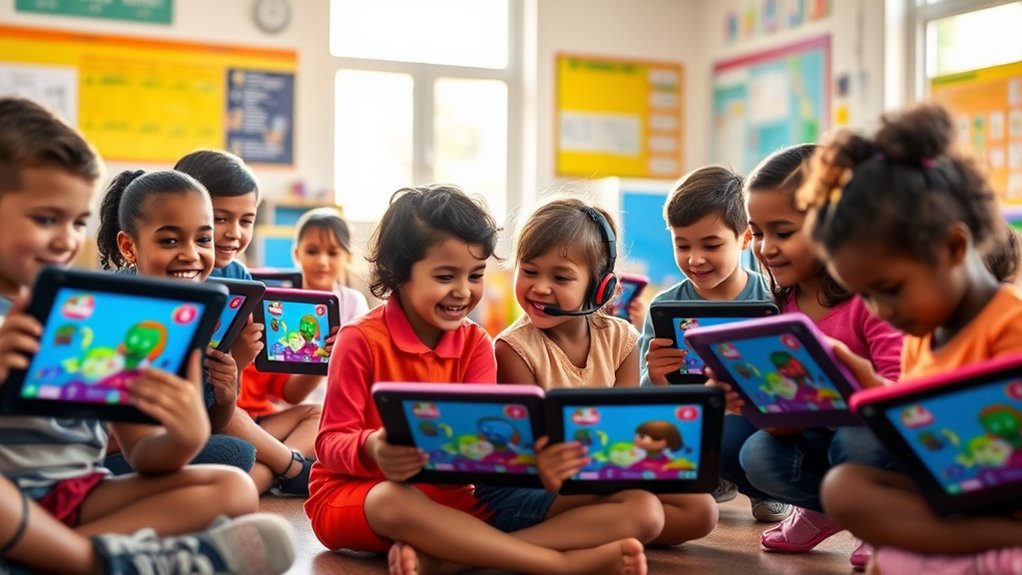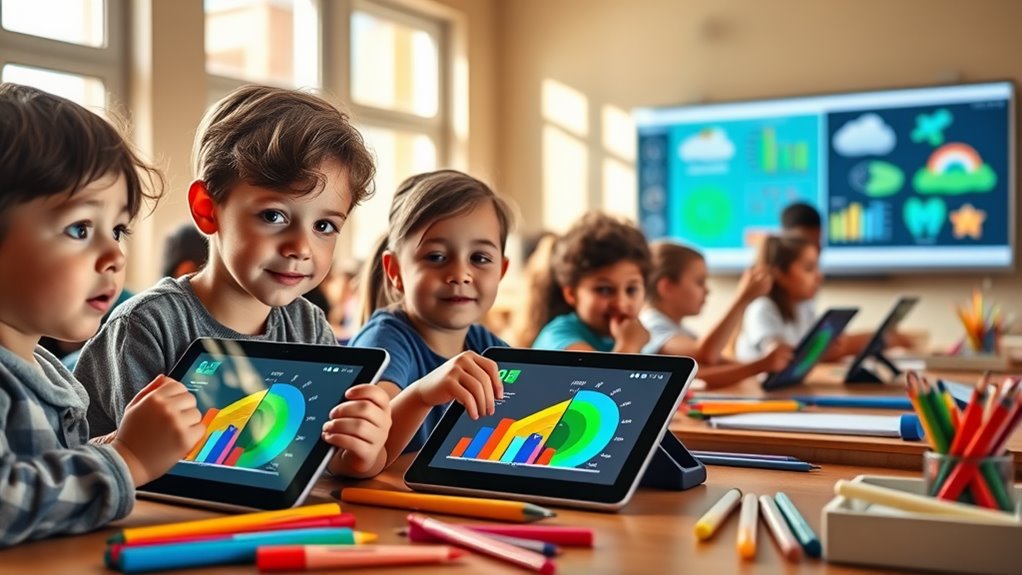Is Too Much Screen Time Hurting Your Child’s Brain
Yes, too much screen time can hurt your child’s brain. It affects cognitive development, leading to diminished attention spans and critical thinking skills. Children exposed to excessive screens may struggle with face-to-face interactions and social cues. Their mental health can also suffer, resulting in increased anxiety and sleep disruptions. While some educational screen time is beneficial, balance is crucial. Limit screen use according to age guidelines and encourage interactive, non-digital activities that foster creativity. Implementing healthy digital habits can make a significant difference in your child’s development and well-being. Discover more ways to support their growth and learning.
Key Takeaways
- Excessive screen time can hinder brain adaptability and learning due to decreased neural plasticity in young children.
- Fast-paced content may lead to diminished attention spans, making it harder for children to focus on sustained tasks.
- Passive consumption of media limits critical thinking skills; interactive activities are essential for cognitive development.
- Increased screen time is linked to heightened anxiety and social isolation, impacting children’s mental health and emotional connections.
- Establishing screen time limits and promoting screen-free activities can help mitigate negative effects on cognitive development.
Understanding Screen Time Guidelines
As you navigate the world of screen time for your child, it’s crucial to understand the guidelines set by experts. The American Academy of Pediatrics offers clear screen time recommendations based on age.
For children under 18 months, it’s best to avoid screen time altogether, except for video chatting. For toddlers aged 18 to 24 months, if you choose to introduce digital media, opt for high-quality programming and engage with your child during viewing.
For preschoolers ages 2 to 5, the guidelines suggest limiting screen time to one hour per day of high-quality content. It’s essential to co-view and discuss the material to enhance understanding.
As your child enters elementary school, the age guidelines shift slightly, permitting more screen time for educational purposes, while still encouraging balance with physical activity and face-to-face interactions.
Effects on Cognitive Development
Screen time can significantly influence a child’s cognitive development, making it vital to consider the quality and quantity of content they consume.
Here are three key areas where screen time impacts cognitive growth:
-
Neural Plasticity: The brain’s ability to adapt and reorganize itself is impacted by the types of stimulation it receives. Excessive screen time may hinder this natural process, affecting learning and problem-solving skills.
-
Attention Span: Engaging with fast-paced content can condition children to expect constant stimulation. This can reduce their attention span, making it difficult to focus on tasks requiring sustained concentration.
-
Critical Thinking: Passive consumption of content often lacks the engagement necessary for developing critical thinking skills. Interactive and educational activities are essential for fostering deeper cognitive abilities.
In essence, while some screen time can be beneficial, too much of it can disrupt neural plasticity and adversely affect attention spans.
It’s crucial to strike a balance by prioritizing high-quality content and encouraging interactive experiences that support healthy cognitive development.
Behavioral Changes Linked to Screens
Navigating the digital landscape can lead to noticeable behavioral changes in children, often stemming from their screen interactions. You might observe that your child’s attention span is dwindling, making it harder for them to focus on tasks that don’t involve screens. This shift can be alarming, especially when you consider how crucial attention is for learning and development.
Additionally, excessive screen time can impact your child’s social skills. When much of their communication happens through screens, they may struggle with face-to-face interactions. You might find that they’ve difficulty reading social cues or engaging in meaningful conversations, which can affect their relationships with peers.
As a parent, it’s essential to monitor and balance your child’s screen time. Encourage activities that promote real-life engagement, like playing outdoors or joining clubs.
These experiences can help enhance their attention span and social skills, providing a well-rounded foundation for their growth. By being proactive, you can steer your child toward healthier habits and mitigate the behavioral changes linked to screens, ensuring they thrive in both digital and real-world environments.
Impact on Mental Health
The rise of digital devices has raised concerns about their impact on children’s mental health. With increased screen time, kids may struggle with emotional regulation and stress management, affecting their overall well-being.
Here are three key worries you should consider:
-
Increased Anxiety****: Excessive screen use can heighten feelings of anxiety in children, making it harder for them to cope with everyday stressors.
-
Social Isolation: Spending too much time on screens can lead to reduced face-to-face interactions, which are crucial for developing social skills and emotional connections.
-
Sleep Disruption: The blue light emitted from screens can interfere with sleep patterns, resulting in fatigue that exacerbates mood swings and irritability.
These factors intertwine to create a cycle where poor mental health can further drive screen dependency.
If you notice your child struggling with managing their emotions or dealing with stress, it may be time to reassess their screen habits.
Encouraging healthier interactions with technology can help them develop better coping mechanisms and improve their emotional regulation, setting them up for a happier, more balanced life.
Balancing Screen Time and Activities
With mental health concerns on the rise due to excessive screen time, finding a balance between digital activities and other pursuits is increasingly important.
You’ve likely heard about screen time management, but it’s essential to put it into practice. Establishing clear limits on how long your child spends in front of a screen can help create healthier habits.
Encourage them to engage in active play, which not only boosts physical health but also fosters social skills and creativity. Outdoor activities, sports, and even simple games can provide a refreshing break from screens.
You could set aside specific times for screen use, making it a treat rather than a default.
Also, consider making family activities screen-free, such as game nights or nature walks. These moments not only strengthen bonds but also serve as a reminder that fun exists beyond the digital world.
Tips for Healthy Digital Habits
While it’s easy to get caught up in the digital world, developing healthy digital habits is crucial for your child’s overall well-being. You can help them navigate technology positively by implementing a few key strategies.
Here are three tips to consider:
-
Establish Screen Time Limits****: Set clear boundaries on daily screen time, ensuring it aligns with recommended guidelines. This promotes balance and encourages other activities.
-
Encourage Screen-Free Activities*: Foster *creativity and physical health by introducing screen-free activities like reading, painting, or outdoor play. These activities not only engage your child but also help reduce dependence on screens.
-
Plan Regular Digital Detoxes****: Designate specific times, like weekends or family nights, for a digital detox. Use this time to connect without screens, allowing for meaningful interactions and reducing overall screen exposure.
Frequently Asked Questions
What Age Is Considered Too Young for Screen Exposure?
Imagine a delicate flower; early exposure to screens can stunt its growth. For infants and toddlers, it’s best to limit screen time, as their cognitive development needs nurturing through real-world interactions rather than virtual distractions.
Can Screen Time Affect Sleep Quality in Children?
Yes, excessive screen time can disrupt your child’s sleep patterns. The blue light emitted from screens interferes with melatonin production, making it harder for them to fall asleep and stay asleep through the night.
How Do Different Types of Screens Impact Development?
Different types of screens can impact development uniquely. Interactive media can enhance digital literacy, fostering creativity and problem-solving skills, while passive content might hinder critical thinking. Balancing both is key to your child’s growth and learning.
Are Educational Apps Better Than Passive Screen Time?
Imagine a garden thriving with rich soil versus one choked by weeds. Educational apps can nurture your child’s cognitive development, offering educational benefits, while passive screen time might just let their potential wither away.
What Role Do Parents Play in Managing Screen Time?
You play a crucial role in managing screen time by setting limits and encouraging balanced activities. With effective parental monitoring, you can ensure your child engages with technology positively, fostering healthy habits and learning experiences.





